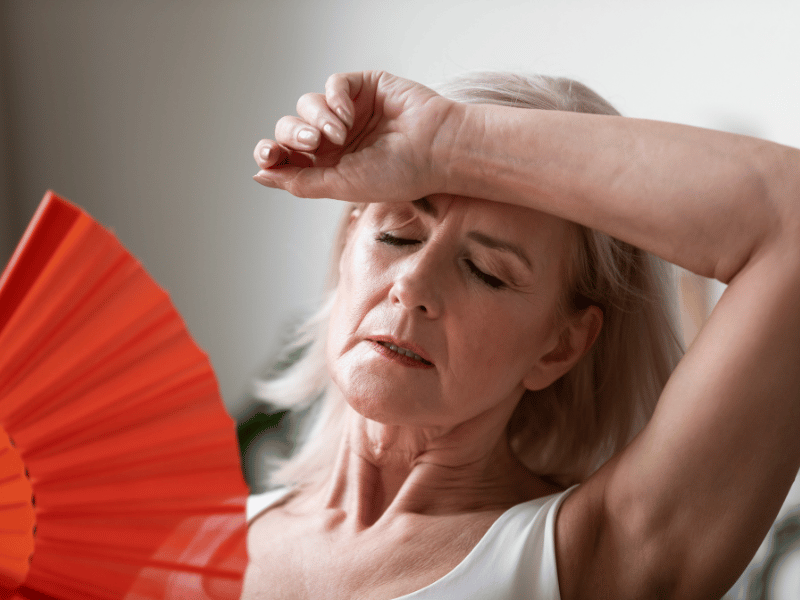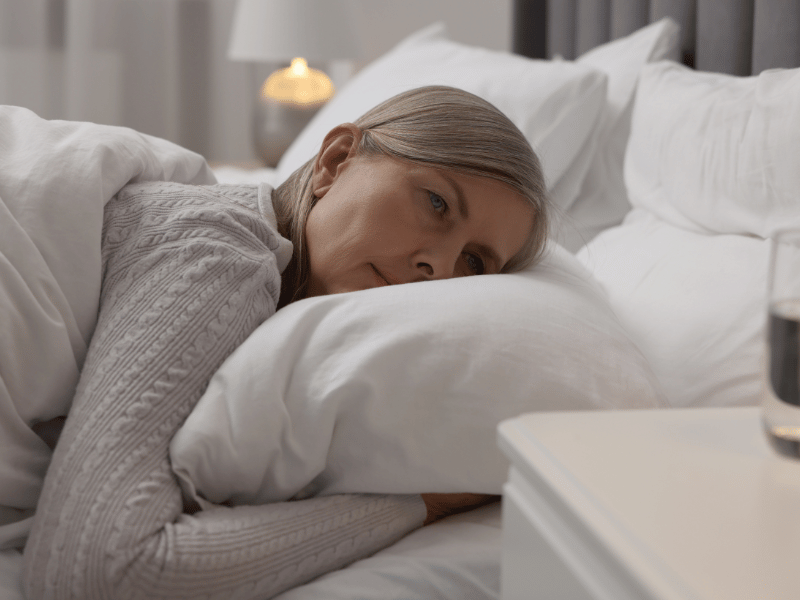


Menopause is a natural hormonal process that many women approaching their 50s start to experience. During the perimenopause phase, it’s common to experience various symptoms, one of which is a change in sleep patterns. The prevalence of sleep problems is estimated to be around 40-60% for midlife women [1].
In this article, we’ll look at how and why menopause affects sleep quality and what can be done to manage the symptoms for better sleep.

Menopause is described as the final stage of a woman’s life in which her menstrual period stops permanently. It is also the stage where a woman can no longer get pregnant. It is not a disorder of any sort but rather a normal aspect of aging for women [2].

During perimenopause or the transition phase to menopause, many women may experience menopausal symptoms.
The typical symptoms include [2]:

Menopause affects sleep in many ways. It can cause sleep disturbances, resulting in poor sleep quality. It is often due to the changes in hormones that occur during menopause.
The declining levels of progesterone and estrogen hormones are one of the main reasons for sleep disorders like insomnia. These changes can cause difficulty staying asleep, and difficulty maintaining sleep often exacerbating feelings of fatigue and irritability [3], [4].
Sometimes, insomnia during menopause may also be related to hot flashes and a decrease in melatonin levels as you age. Mental health-related conditions such as anxiety and depression can also be another contributing factor.
Fortunately, insomnia during menopause can be treated by making lifestyle changes or opting for treatment such as hormone therapy [5].
Additionally, some women may also develop sleep disorders such as obstructive sleep apnea during this period due to the loss of reproductive hormones— estrogen and progesterone.
According to experts, post-menopausal women have an increased risk of getting sleep apnea compared to pre-menopausal women [6].
You can implement several strategies to help you improve your sleep and reduce sleep disturbances naturally. Here are the 5 tips:

First, make sure to eliminate any caffeine and alcohol consumption before bed. Limit your consumption of caffeine to early morning and early afternoon. It is a stimulant that can keep you awake for hours so you want to avoid it before going to bed.
Practice good sleep hygiene and adopt a relaxing bedtime routine. Try meditating, doing some light yoga exercises, or reading a book to unwind before bed. Having a relaxed mind can help you to fall asleep more easily and stay asleep for longer.
At night, it’s best to dim down the lights in your bedroom and avoid using any electronic devices at least 1 hour before you are about to sleep. Electronic devices emit blue light which may interfere with the production of melatonin, a sleep hormone. It sends the signal to your brain to stay awake rather than fall asleep.
Another way that you can try to improve your sleep quality during menopause is to avoid taking too many naps and for too long past 3 pm. Doing so may affect your ability to fall asleep at night as you feel more awake and energized. Try to keep power naps during the daytime when you need to be productive.
Keep a healthy diet by eating fresh fruit and vegetables. Also, try to avoid eating heavy foods late at night. Eat at least 3 to 4 hours before going to bed so that your body has enough time to digest. You are also recommended to maintain a good exercise routine to get the recommended amount of exercise and nutrients. Exercise has been shown to improve sleep quality and decrease anxiety levels. So, it is a great way to combat the effects of menopause on sleep.

Besides self-management strategies, you may also opt for medical interventions such as cognitive behavioral therapy for insomnia (CBT-I) or hormone therapy (HT). In these cases, you will have your sleep problems and sleep quality assessed by a sleep specialist before starting the treatment.
Suppose you suspect that you may have an underlying condition such as sleep-disordered breathing, restless legs syndrome, depression, or anxiety that’s contributing to your sleep problems. In that case, you are advised to speak to a medical professional.
In conclusion, menopause can contribute to poor sleep quality mainly due to changes in the hormones and menopausal symptoms such as hot flashes and night sweats. The decrease in progesterone and estrogen levels increases the likelihood of women experiencing insomnia and sleep-related disorders. This is why adopting self-management strategies and treatment options is important for managing menopause-related sleep problems.
Alternatively, you can also manage your sleep better by keeping track of your sleep quality and incorporating expert-recommended strategies with the ShutEye® app. Try it free for 7 days and witness a 90% improvement in your sleep quality!
Baker, F. C., Lampio, L., Saaresranta, T., and Polo-Kantola, P. (2018). Sleep and sleep disorders in the menopausal transition. Sleep Medicine Clinics, 13(3), 443. Available at: https://doi.org/10.1016/j.jsmc.2018.04.011
Geng, C. (2021) Menopause and insomnia: What is the link? [online]. Available at: https://www.medicalnewstoday.com/articles/menopause-and-insomnia
John Hopkins Medicine (2024) How Does Menopause Affect My Sleep? [online]. Available at: https://www.hopkinsmedicine.org/health/wellness-and-prevention/how-does-menopause-affect-my-sleep
Maki, P., Panay, N. and Simon, J. (2024) Sleep disturbance associated with the menopause [online]. Available at: https://journals.lww.com/menopausejournal/fulltext/2024/08000/sleep_disturbance_associated_with_the_menopause.11.aspx
National Institute on Aging (2024) What Is Menopause? [online]. Available at: https://www.nia.nih.gov/health/menopause/what-menopause
Women's Health Concern (2021) Menopause and insomnia [online]. Available at: https://www.womens-health-concern.org/wp-content/uploads/2022/12/17-WHC-FACTSHEET-Menopause-and-insomnia-NOV2022-B.pdf